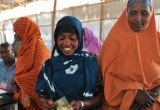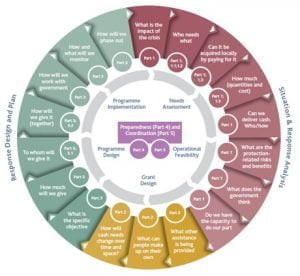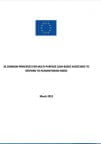Responding to Diverse Needs: Multipurpose Cash Grants

Multipurpose Cash Grants (MPGs) are unrestricted[1] cash transfers that “place beneficiary choice and prioritisation of his/her needs at the forefront of the response”.[2] MPGs recognise that people affected by crisis are not passive recipients of aid who categorise their needs by sector. They offer people affected by crisis a maximum degree of flexibility, dignity, and efficiency commensurate with their diverse needs.As recent studies show, MPGs can also contribute to a number of protection-related outcomes.[3]
When are MPGs appropriate?
MPGs can be used regardless of context – urban and rural, rapid and slow onset, chronic and acute crises, and natural and complex disasters. A context-specific situation and response analysis of different humanitarian interventions, including in-kind and other cash-based responses, is crucial for determining the appropriateness and feasibility of MPGs. MPGs can be used alone or alongside other sector-specific interventions, enhancing the latter’s effectiveness. MPGs can also be “topped up” to respond to punctual or seasonal needs, such as school-related fees or promotion of seasonal livelihoods activities. If humanitarian MPGs are delivered on a regular basis and over time, they may also be aligned with or rolled into government-run national social protection programmes, which in most cases are MPGs. UNHCR has delivered MPGs in this way, through governments, in Ukraine and Zambia.
UNHCR has been using unrestricted cash transfers since the 1980s, largely for voluntary return and repatriation programmes. However, during the past decade, cash-based interventions (CBIs) for refugees have expanded dramatically, particularly during the Iraqi refugee crisis and most recently to meet the basic needs of Syrian refugees in Jordan, Lebanon, and Egypt. UNHCR’s multipurpose cash assistance programme in Jordan assisted an average of 20,000 families each month during 2014, with monthly disbursements to refugees totalling approximately US$ 2.6 million.
In Lebanon, UNHCR is currently disbursing MPGs through 145,000 cards. UNHCR also uses MPGs on a case-by-case basis in countries such as Malaysia, India, Egypt, Jordan, Iraq, Uganda, and the Republic of Congo, to cover basic needs and diverse protection-related costs for people with specific risks or needs, ranging from urgent transport to a health clinic, to special assistance for persons with disabilities to safe accommodation for persons threatened by gender-based violence.
The Operational Guidance and Toolkit for MPGs
Ten partners came together under an ECHO-funded Enhanced Response Capacity project led by UNHCR to draw on their breadth of experience in operationalizing MPGs, drawing from challenges and lessons learned in current field programmes. The Operational Guidance and Toolkit for MPGs provides comprehensive and practical guidance for humanitarian actors to assess the feasibility, conceptualise the design, and structure the implementation of MPGs. The CALP Network, DRC, OCHA, Oxfam, Save the Children, UNHCR and WFP worked on different components of the toolkit and agreed on the overall principles, including for Multi-Sector Market Assessment and Response Analysis.
The Operational Guidance and Toolkit for MPGs is divided into chapters and annexes for ease of reference. Field colleagues may pick up an example of Standard Operating Procedures, or turn to the section on Targeting, as needed. The Toolkit focuses on MPGs whose primary objective is to meet basic needs.
MPGs, like all interventions, present both opportunities and risks from a protection and Do No Harm perspective. Protection “flags” appear in each section to remind practitioners about good programming, including participatory approaches, and provide tips on mainstreaming protection in MPGs.
The Operational Guidance and Toolkit for MPGs assumes a basic knowledge of CBIs and does not repeat other tools and reference materials available on the CALP Network website. Rather, it adds value by focusing on what is new to humanitarians as we scale up this type of cash-based assistance

Resources on multipurpose cash grants and protection:

Operational Guidance and Toolkit for Multipurpose Cash Grants (UNHCR, the CALP Network, DRC, OCHA, Oxfam, Save the Children, WFP). The toolkit is available in an online version and as a PDF in both English and French.

Guide for Protection in Cash-based Interventions (UNHCR, DRC, Global Protection Cluster, Oxfam, Save the Children, WRC and WFP). This resource provides guidance, minimum necessary information, and key resources needed to ensure that protection risks and benefits are considered and monitored throughout the CBI program cycle, using a community-based approach and participatory methods.
 10 Common Principles for Multi-purpose Cash-based Assistance to Respond to Humanitarian Needs (ECHO)In June 2015, the Council of Europe adopted 10 common principles for Multi-Purpose Cash-Based Assistance. While only a small percentage of humanitarian assistance is currently cash-based, the common principles are paving the way for greater advocacy with other donors and partners, as well as in view of the World Humanitarian Summit.
10 Common Principles for Multi-purpose Cash-based Assistance to Respond to Humanitarian Needs (ECHO)In June 2015, the Council of Europe adopted 10 common principles for Multi-Purpose Cash-Based Assistance. While only a small percentage of humanitarian assistance is currently cash-based, the common principles are paving the way for greater advocacy with other donors and partners, as well as in view of the World Humanitarian Summit.
This article was written by Joanna Friedman, Cash and Protection advisor (UNHCR) and Lou Perrin, ERC Grant Manager (UNHCR)
[1] “Unrestricted” denotes that the cash is not restricted to certain types of expenditures or vendors. “Unconditional” refers to the fact that beneficiaries do not need to meet conditions (attend a training, produce receipts, etc.) to receive cash, only be eligible based on vulnerability criteria. MPGs can be conditional or unconditional (the CALP Network 2015).
[2] Ibid.
[3] See cashlearning.org/protection for 2015 studies from Lebanon, Jordan, Turkey and Afghanistan, and an updated literature review on Protection Outcomes in Cash-based Interventions.


